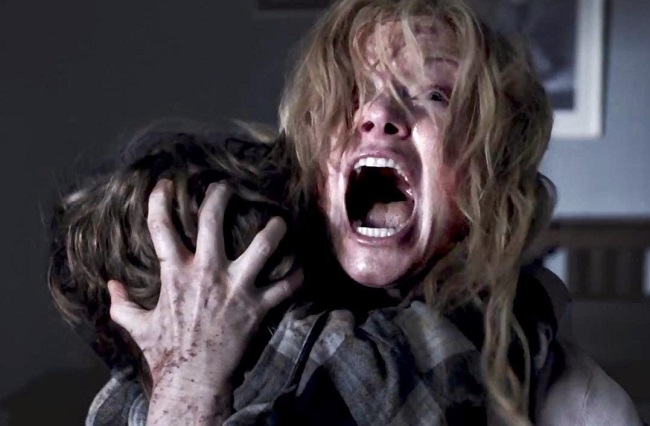

Director Jennifer Kent originally wanted to make The Babadook in black-and-white and it's easy to see why. The Australian horror film, which has played at fests all year and was just recently released on VOD, is a throwback to horror films of decades long past. No swooping cameras or overly elaborate effects shots here, but you will find plenty of intense close-ups and creepily composed static shots, stacked upon one another to create feelings of isolation, hopelessness and dread. There is a monster — and we'll get to him later — but much of the movie's effectiveness is courtesy of a keen throwback visual style and a fantastic central performance by actress Essie Davis.
She plays Amelia, a frazzled widow doing her best to raise young son, Samuel, in the wake of her husband's death. (He died in a car wreck while driving her to the hospital for Samuel's birth, which is alluded to in a stylish opening scene — one of the film's few visual flourishes.) Things are not easy for Amelia, who works a shit job as an orderly in a nursing home and can't even find the time to masturbate because Samuel is constantly fleeing to her room at night to escape the monster he swears is hiding in his room. Before long, that monster has a name — Mister Babadook — courtesy of a dark and disturbing children's pop-up book the two discover on Samuel's bookshelf.
As Samuel's mania grows worse, causing him to lash out at those around him, Amelia feels her own sanity begin to drift away. She begs her doctor for meds to help Samuel sleep, but even that respite is temporary as the Babadook starts making its presence known to her as well. Is he a real supernatural manifestation? Or an allegory for the crushing emotional weight one must feel as a single parent who has lost their support system and whose entire life is now consumed by raising a troubled first-grader? Well, it's both really, and Kent is careful to make sure both mission statements are strongly supported by the film. There are clever hints that Amelia herself may have wrote the pop-up book, though that notion is never explicitly stated as fact. And where most horror movies eventually make a beeline for the obvious good-vanquishes-evil ending, The Babadook attempts a more complicated, thoughtful resolution. The result is a little corny, but it also fits well thematically with the story the film tells about living with burdens you never expected to have to face alone.
It is not possible to undersell how good Davis is here. Her character is already overwhelmed as the movie begins, and, by the end of it, Davis has proven so effective at portraying Amelia's loss of control that you feel sympathy for a woman who might very well murder her own child. Without her performance, the movie doesn't work. Period. Noah Wiseman plays Samuel, and as far as child actors in horror films go, he's fine, if not any kind of revelation. He's helped by a script that keeps Samuel interesting. You understand why he's become so troubled, and I enjoyed seeing his penchant for stage magic and self-built weapons woven throughout the movie. There are a few other characters interspersed throughout, though none are really that important. In fact, one of them, a co-worker with a crush on Amelia, awkwardly disappears early on in the film's run time. This is a really a two-person show.
Or three, if you count the Babadook. You do get to see him — in glimpses, in the shadows. He's fairly lo-fi, having been created using stop-motion effects and other low-budget tricks. His design is somewhat Slender Man-ish, and he speaks using a raspy, threatening voice that's over-modulated and maybe a little too cartoony. (That's not my only problem with the audio choices made in this movie either. Too many times Kent abruptly drops soundtrack music at a smash cut. It gets to the point where you can hear the needle scratch even if it's not actually there.) Had the movie depended entirely on the monster reveal, I don't think the look of the Babadook would have been good enough to support it. But considering how strong the emotional underpinnings and general style of the film are, he works well enough so as not to break the story's dark spell.
The Babadook is an easy movie to root for. It's Kent's first-ever feature, based on a 10-minute short she made called Monster. Most of the money for the budget was acquired through government arts funding, but the filmmaking team raised an additional $30,071 through Kickstarter, beating their goal by a mere seventy-one bucks. And now that the movie has become something a cult sensation, Kent is telling reporters that there will never be a sequel no matter how much money Hollywood throws at her. It's a cool real-world story, although one that wouldn't much matter if the movie stunk. But The Babadook is a good movie, a very good one, and disturbing enough that I'd imagine horror fandom will hold it in high esteem for quite some time.
For your viewing pleasure, here's the short The Babadook is based on. It is in black-and-white, as well as somewhat spoilery for the full-length movie. But it's interesting to see the early grasp Kent had on the distinct style that would benefit the film she eventually made.











